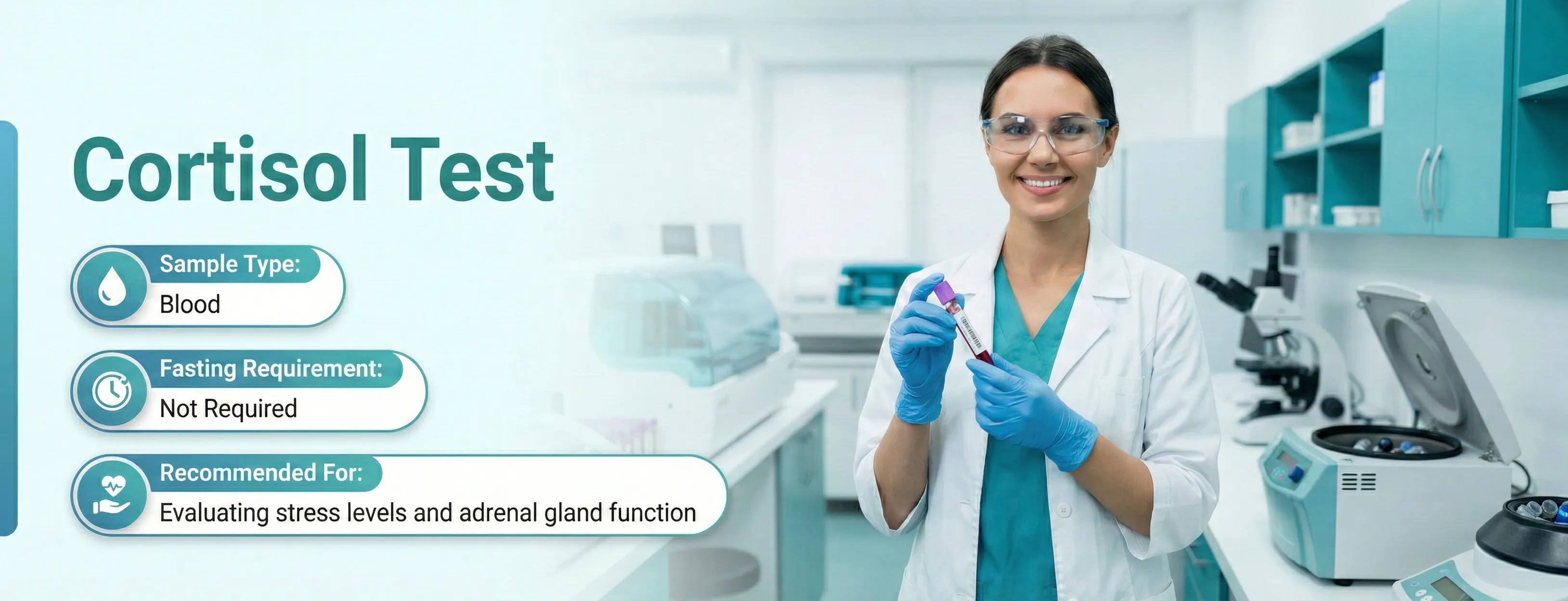479+ orders placed in your location
100% NABL & ISO Certified Lab • 100% Accurate Reports
Cortisol Test
Serum Cortisol, Urinary Cortisol, Salivary Cortisol, Hydrocortisone, Blood cortisol, Plasma cortisol, Free cortisol
- SummaryThe Cortisol (8 AM) test measures the level of cortisol, a hormone produced by the adrenal glands, at its peak time in the morning. It may be advised to people with chronic stress, unexplained weight gain, unexplained mood changes, weakness etc. The test is done using a blood sample, usually collected around 8 AM when cortisol levels are naturally highest. Fasting is generally recommended for accurate results.Read more
- Reports Within17 HrsView Sample Report100% NABL & ISO Certified Labs
- SampleBlood
- AgeAll Age Group
- GenderMale and Female
- FastingNot Required
PharmEasy Promises
Know More About The Test
A quick info on Cortisol Test
Overview
The most common way of measuring Cortisol levels is a blood test (two other ways are urine and saliva tests). While these levels vary throughout the day, the Cortisol (8 am) test is conducted in the morning, when the cortisol is present in the body at higher levels. It is lowest at night.
Produced by adrenal glands, Cortisol is a steroid hormone. Since most bodily cells have cortisol receptors, this hormone is responsible for (including, but not limiting to):
- Controlling blood sugar levels
- Regulating glucose metabolism
- Reducing inflammation
- Releasing insulin
- Assisting with memory formulation
- Controlling blood pressure
Cortisol is also known as “stress hormone”, as it’s secreted by the adrenal glands when confronted by some external threat, stress or fear. In a fight-or-flight situation, Cortisol acts like a natural alarm system that communicates with the brain to curb nonessential functions. However, as mentioned above, this steroid hormone does much more than a stress hormone.
Cortisol levels vary from person to person and thus, a patient can have low or high cortisol levels even without these uncommon syndromes. Consult your doctor for an actual diagnosis of Cortisol level for better understanding.
Stress has been a big challenge for the Indian population to deal with in the past few years. About 82% of the Indian population have been recorded as stressed.
Sample Type
The Cortisol test results are most commonly based on the analysis of a blood sample. Some healthcare providers may diagnose Cortisol levels via a patient's urine or saliva samples.
Risk Assessment
Cushing syndrome, Addison’s disease
What does this test detect?
Cortisol test is done to measure the level of cortisol, which is a steroid hormone. A doctor can prescribe a cortisol test to adults (both male and female) if they see symptoms that suggest either too high or too low levels of cortisol in the blood.
Indications for Cortisol Test
A doctor may call for a Cortisol (8 am) test if the patients witness the following symptoms:
- Rapid weight gain in the torso or core of the body
- Slender arms and legs
- Flushed face
- High blood pressure
- Changes in the skin
- Weight loss
- Dark patches of skin
- Muscle and joint pain
- Extreme tiredness (fatigue)
- Low blood pressure
- Belly pain
- Nausea or vomiting
- Diarrhoea
- Reduced armpit and pubic hair
- Reduced sexual desire in women
A doctor might also suggest a Cortisol level test when they suspect an adrenal crisis. These crises can be life-threatening, with symptoms ranging from shock or very low blood pressure and loss of consciousness, dehydration, confusion, sudden or severe pain in the belly, lower back or legs.
How frequently should you take this test?
A Cortisol level test helps with the diagnosis of two rare conditions — Cushing Syndrome and Addison Disease. The timing of the cortisol test plays a crucial role in its diagnosis because cortisol levels vary throughout the day. If a healthcare professional thinks that a patient is making too much cortisol, he might suggest a 4 pm Cortisol test. However, if the doctor thinks that the patient may not be making enough, a Cortisol test might be done in the morning at 8 am.
If the result of the Cortisol test confirms a diagnosis, appropriate medication should be taken immediately.
Test Preparation
Before the Test
Generally, no preparation is mandated for a Cortisol test. However, if this test coincides with another that requires certain measures, your healthcare provider may advise you to refrain from consuming specific food items. It is advisable to always seek guidance from your doctor prior to the test for optimal results.
During the Test
A small sample of your blood will be extracted from a vein in your arm. Here are the key aspects to anticipate during the test:
- The region where the needle will be inserted will be disinfected with an antiseptic.
- A tourniquet band will be applied to your arm to enhance vein visibility.
- A needle will be introduced into the vein to draw the blood. This may cause a brief pinching sensation lasting a few seconds.
- The blood will be collected in a vial or small test tube and the blank label will be filled with your details.
After the Test
Following the blood collection:
- A bandage will be affixed to the puncture site to prevent bleeding.
- Minor bruising is common. An uncommon effect is lightheadedness. You should sit for a few minutes if you feel dizzy.
- Contact your healthcare provider in case of bleeding, pain, or rashes at the puncture site.
Parameters
A doctor prescribes a Cortisol level test to check for an increase or decrease in cortisol production in the blood. Cortisol, while commonly referred to as a stress hormone, affects many different body systems.
A Cortisol level test measures the amount of Cortisol the adrenal glands secrete throughout a day. When our body produces too much or too little cortisol, it may indicate the presence of uncommon diseases — Cushing syndrome and Addison disease. Measuring blood cortisol levels can help diagnose these two rare conditions.
Some other conditions for which make a strong case for the Cortisol test are:
- Acute adrenal crisis
- Sepsis
- Low blood pressure
Ranges
Normal cortisol levels are usually highest early in the morning and lowest at about midnight.
Timing | Normal Range |
6 to 8 am | 10 to 20 micrograms per deciliter (mcg/dL) |
Around 4 pm | 3 to 10 mcg/dL |
The normal values and reference ranges of the test may vary from lab to lab. Please refer to the ranges mentioned in the report and consult a doctor to understand the interpretation of lab reports.
Cortisol level test results may vary depending on the patient's age, gender, health history, the method used for the test and other things. After the diagnosis, patients must consult with their doctors for the next course of action.
Besides a blood test, a doctor may also test the cortisol levels in urine or saliva. For a cortisol urine test, a patient may have to collect all urine during a 24-hour period. Also called a “24-hour urine sample test”.
A cortisol saliva test, on the other hand, is usually done at home, late at night, when cortisol levels are lower. Doctors usually provide patients with a kit for this test. They may also instruct the patient to not eat, drink or brush their teeth for a period of time (maybe sometime between 15 to 30 minutes) prior to the test.
Before screening for a cortisol test, a doctor may ask the patients to stop taking medicines that can affect the result. Drugs including:
- Anti-seizure drugs
- Oestrogen
- Human-made (synthetic) glucocorticoids, such as hydrocortisone, prednisone and prednisolone
- Androgens
Test Result Interpretation
The main reason for the cortisol level test is to check for too high or too low levels of cortisol in the blood.
What do High and Low Cortisol Levels Mean?
While Cortisol is important for normal body function, too much or too little secretion of Cortisol can be bad for health. Therefore, a doctor prescribes a Cortisol test when they notice certain symptoms in the patients.
High levels of Cortisol in the blood may mean that a patient has an uncommon condition, Cushing's syndrome, while low levels may indicate Addison’s disease or another type of adrenal disease.
Some women with high cortisol levels may also witness a change in their libido and menstrual cycle, even when they don’t have Cushing disease. High Cortisol levels may also lead to anxiety and depression in some patients.
Low levels of Cortisol, on the other hand, can result in a condition known as Addison disease or primary adrenal insufficiency. It may also be a sign of some other issue with adrenal glands.
In some cases, certain factors such as stress, infection, pregnancy, etc., can also affect cortisol levels. This doesn’t necessarily mean that a patient has the above-mentioned condition needing immediate treatment.
A physician may also order additional tests before making a final diagnosis of not-normal cortisol levels. These tests may include additional blood, urine tests and imaging tests, such as CT and MRI scans to look at adrenal and pituitary glands.
Risks and Limitations
The Cortisol test is a commonly done blood test with rare risks of complications. See your doctor if you notice:
- Persistent bleeding at the site of needle-insertion.
- The skin where the needle went in becomes red, swollen, or hurts.
Limitations of the test
- The accuracy of the test could be affected due to equipment or human mistakes.
- Misinterpretation of the markers leading to inaccurate reports.
Was This Test Information Helpful?
Please rate your experience
References
People Also Ask
What time of day is cortisol lowest?
Does caffeine increase cortisol?
What foods increase cortisol?
Does cortisol cause anxiety?
Have any doubts? Ask us.
Ask us anything about the Cortisol Test to understand it better
We provide trusted, expert-curated health content to support better awareness,prevention, and care.
Backed by experienced doctors, medical experts, and strict editorial standards.


